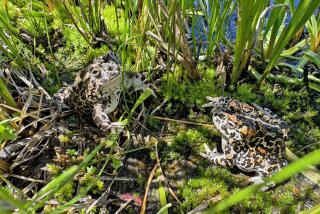Dumping of Pets Is Common Practice
- Share via
Old Bob, a 4-foot-long, 100-pound alligator snapping turtle, was a local legend for years before repairs to Fullerton’s Laguna Lake dredged him up last September. A monitor lizard appeared several years ago in a dam pond near Yuma, Calif., but was never captured. Now an alligator in Harbor City’s Lake Machado has alternately thrilled and tantalized a growing crowd.
But the gator, which had been dubbed Harbor Park Harry, is only the newest face of an old problem: people releasing pets, sometimes exotic ones, at local parks.
While there have been fierce debates over the Harbor City animal -- Is it an alligator or caiman? male or female? recent resident or long-time inhabitant? -- one detail that observers, rangers and experts agreed on was this: Harry was probably a pet quietly let go at the park.
By dawn Wednesday, two men had been arrested on suspicion of dumping the gator, a male named Reggie. A tip led investigators to the men’s homes, where they seized three alligators, four piranha, one rattlesnake, three desert tortoises, six tortoise eggs, one scorpion and about 10 pounds of marijuana.
Authorities say it’s hard to determine how frequently pets are abandoned at parks, but they know it’s happening. A few years back, workers arrived at a San Pedro area park and found about a dozen abandoned aquariums crawling with about 50 hamsters and rats.
Despite campaigns against the practice, it’s not uncommon to see an upsurge of ducklings and rabbits dumped at parks after Easter, likely pet presents that don’t work out, officials said. And animals as varied as common red-eared slider turtles and piranha have appeared at local park lakes. But it’s the exotic animals that generally get the attention.
Mike McBride, an assistant chief in the California Department of Fish and Game, called exotics the equivalent “of seeing a canary in the middle of the Sahara Desert.”
“People love the legends,” McBride said. In reality, though, released animals can be dangerous or have diseases that harm other animals in the environment. “Once you scratch underneath the surface of the awe of it, the humor evaporates pretty fast,” he said.
Abandoning an animal is a crime in California, punishable by six months in prison and/or a fine of up to $1,000, according to the Los Angeles city attorney’s office. But the city has not prosecuted anyone for the crime in more than two years, said Frank Mateljan, spokesman for the office.
Pet owners, unaware of the law or confident that they won’t be caught, often slip into parks at night and release animals, said David Diliberto, director of field operations for the Los Angeles Department of Animal Services. People may feel less guilty putting pets into a pond or grassy meadow than taking them to shelters where they could be euthanized, he said.
“People get this idea in their head: ‘We’re releasing it to the wild,’ ” Diliberto said. “A rabbit you’ve been feeding rabbit chow all it’s life doesn’t quite understand what to do.”
The result is that the animals starve or are easily picked off by predators. Exotic animals used to warm temperatures rarely survive the winter.
Explanations for park pet releases are predictable: The animal has become too large, the pet is too difficult to care for, the owner is moving.
Russ Smith, reptile curator at the Los Angeles Zoo, says he gets about two calls a day from people hoping the zoo will take in their pets, frequently green iguanas and pythons. He has to break the bad news: The zoo doesn’t have room for them.
Smith said many of the callers “would make good used-car salesmen,” claiming that their pets are in perfect health and remarkably tame. Smith refers such callers to rescue groups and others that may take the animals. Still, there’s no way to know whether people take his advice.
At Ken Malloy Harbor Regional Park, participants in the recent gator watch said it was clear that the animal was only the most visible nonnative creature in the park.
Enrique Abbo, a member of the Southwestern Herpetologists Society, who spent much of last week looking for the reclusive reptile, said he saw three species of turtle and a large Florida banded water snake.
Ron Berkowitz, harbor region superintendent of the Los Angeles Department of Recreation and Parks, confirmed that the area gets its share of former pets, but he said he hoped the operation to net Reggie would educate the public that leaving an animal is not a game. He also said he was ready for the great gator operation to end.
“I wish it was only a snapping turtle,” he said.
More to Read
Sign up for Essential California
The most important California stories and recommendations in your inbox every morning.
You may occasionally receive promotional content from the Los Angeles Times.










